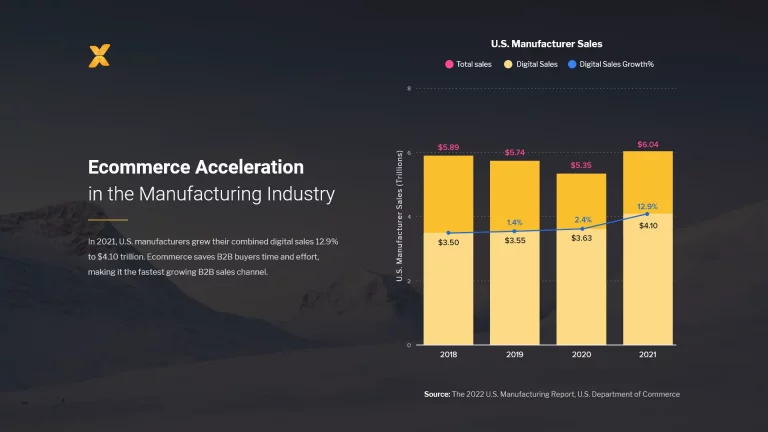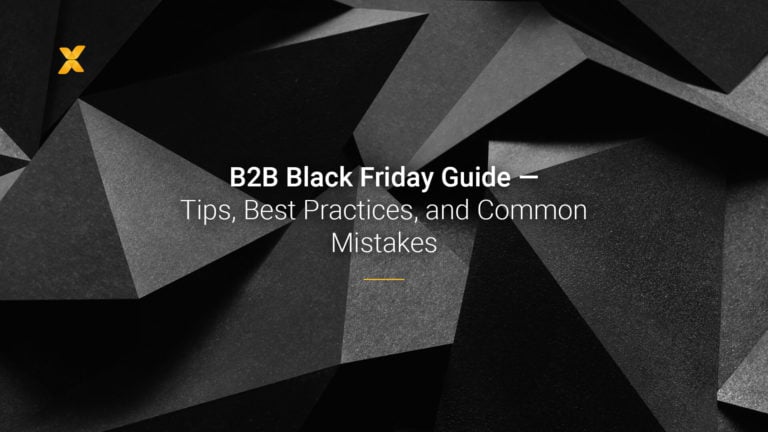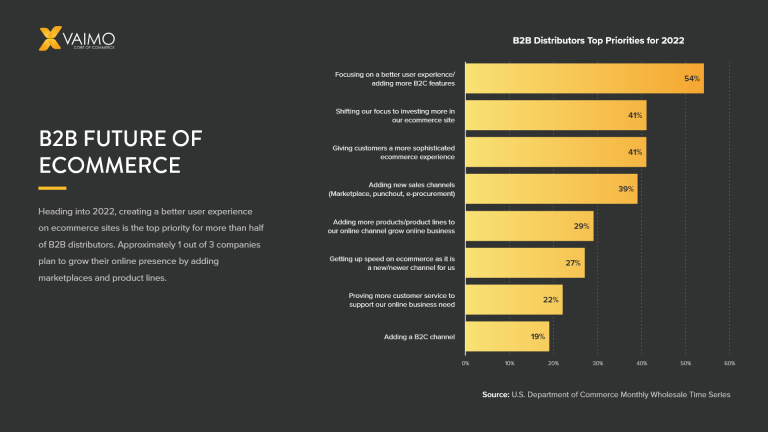The B2B digital landscape is quickly evolving, as well as the shopping behavior of B2B customers, as more and more shift towards shopping online. According to a study by Forrester, over 90% of B2B customers start their business buying process by searching online 1. Moreover, an AMA New York report states that over 70% of B2B customers see company websites as their primary sales channel2.
However, since B2B ecommerce involves bulk orders, complex pricing, and B2B purchasing workflows, a standard B2C ecommerce approach may not be enough. To achieve B2B ecommerce success, businesses need to invest in a tailored ecommerce platform with B2B ecommerce features that help them deliver seamless customer experiences and ensure a smooth buying process. In this article, we will explore the essential B2B ecommerce features every B2B ecommerce platform should have to leave an indelible impression on your customers.
TABLE OF CONTENTS
- Must-have B2B ecommerce features
- Customizable pricing lists & catalogs
- Bulk ordering
- Shared shopping carts and flexible payment methods
- Restricted access control
- Product information management (PIM)
- How Vaimo can help
Must-have B2B ecommerce features
Customizable pricing lists & catalogs
In B2B ecommerce, each business is different and has its own challenges, buying behavior and needs. Unlike B2C, where price standardization is common, B2B transactions are usually more complex as pricing is based on various factors like frequency, volume and contractual agreements. Therefore, tailoring pricing lists and product catalogs to factors like needs, order history, bulk ordering and minimum order quantities of individual customers is critical and valuable.
Offering personalized pricing lists will streamline the buying process for B2B customers and show them that you recognize and understand their unique needs, enhancing the relationship with your customers. Moreover, tailored pricing lists empower you to optimize your offerings for each customer and make you stand out from competitors. All in all, customizable pricing lists & product catalogs will help you create highly tailored customer experiences, increasing customer loyalty and bolstering profit margins.
Related reading: Discover how Vaimo implemented a personalized pricing system for Pronovias
Bulk ordering
Unlike the typical B2C customer who usually orders a single product or a handful of products, B2B companies often need to purchase large quantities to meet their customers’ needs or to be able to maintain their operations. They specifically look for B2B ecommerce websites that let them efficiently, seamlessly and repeatedly place bulk orders.
By facilitating bulk ordering forms and being transparent about availability, (per-unit) pricing, volume discounts and delivery estimates on your ecommerce website, you will simplify the buying process for your customers and empower them to make informed decisions. Moreover, this bulk ordering feature will make manual, multi-entry orders obsolete and reduce potential errors.
Besides that, bulk ordering often comes with tiered pricing models and volume discounts, encouraging bulk purchases even more. All in all, by implementing a bulk ordering feature on your B2B platform, you show your customers that you understand their unique needs and want to support them by enhancing operational efficiency and driving cost-effectiveness. This will, in turn, lead to an increase in customer loyalty and reinforce long-term partnerships.
Shared shopping carts and flexible payment methods
Since B2B product selection and checkout processes often involve multi-step approval processes with different teams, departments and multiple stakeholders, shared shopping carts and the option to manage multiple shopping carts simultaneously are essential. This feature empowers collaborative purchasing by allowing various users to access, modify and approve a single shopping cart. Furthermore, shared shopping carts reduce errors significantly and streamline the B2B decision-making process. In conclusion, shared shopping carts enhance teamwork and streamline the buying journey for businesses.
Besides, all businesses are unique as they vary in financial policies, cash flows and size. Implementing a payment gateway that supports multiple payment options, from bank transfers and traditional credit card payments to buy now, pay later, or even purchase orders, is crucial. By providing this possibility and flexibility, you can cater to a broader clientele and meet their needs and expectations regarding the checkout process. This will reduce friction in the buying process and, therefore encourage customers to repeat purchases.
Both features, shared shopping carts and flexible payment methods, enhance the purchasing experience, resulting in increased customer loyalty and a tailored partnership between businesses.
Related reading: Buy Now Pay Later for business: weighing the pros and cons
Restricted access control
B2B companies often deal with a lot of sensitive data, such as proprietary business information, financial information and customer data. For example, B2B transactions include tailored information like volume discounts, specialized products and catalogs and exclusive partnerships. Granting unrestricted access can lead to data breaches, unintentional reveals of information regarding pricing tiers, competitive vulnerabilities and unintended purchases.
Also, different employees and stakeholders need different levels of access to the ecommerce platform, based on their ecommerce tasks and responsibilities. Implementing a system to restrict access control empowers businesses to ensure that sensitive information, exclusive deals and discounts, and pricing lists are only accessible to authorized stakeholders and employees.
Doing everything you can to protect sensitive data from your customers is extremely important as it’s about preserving trust, ensuring business continuity and upholding reputations. Furthermore, restricted access control helps you adhere to data regulations (such as GDPR or CCPA), making sure that customer data is not just protected, but also compliant.
Moreover, with access control, businesses can keep track of who made specific changes and when these changes were made. This way, only authorized employees can make changes, which will reduce the risk of errors and improve the efficiency of your B2B ecommerce platform.
Related reading: Collect, organize, and manage customer data with a CDP
Product information management (PIM)
A product information management system helps businesses provide more consistent product information to end consumers. With a PIM platform, businesses can collect, enrich and store their product data (product attributes, descriptions, images and other product details) in one place. Once entered into the PIM system, the product information can be efficiently and accurately distributed across multiple sales channels, ensuring customers always have access to the most up-to-date and relevant information. Did you know that businesses implementing a PIM system can correct errors in product details 18x faster than businesses without a PIM?
Moreover, a PIM system ensures that customers have all the information they need to make an informed decision, which results in increased customer loyalty, trust and streamlined sales processes. Leveraging a PIM system can lead to a 20-50% increase in online conversion3!
In conclusion, a PIM system is a real game changer for B2B ecommerce companies. Would you like to know more about PIM and the benefits of PIM? Read our recent blog article about the business benefits of PIM.
How Vaimo can help
At Vaimo, we have around 14 years of experience implementing B2B ecommerce features, ecommerce platforms, technologies and systems like PIM and CDP. We work closely with our clients to select the right tools, B2B ecommerce features and systems and provide a tailored ecommerce solution aligned with their business goals and vision.
Do you need help with your B2B ecommerce strategy and selecting and implementing the right B2B ecommerce features for your business? Reach out to our experts today to discover how we can help you achieve ecommerce success!
Sources
1 – www.icecubedigital.com (Accessed on 26th October, 2023)
2 – www.amanewyork.org (Accessed on 26th October, 2023)
3 – www.plytix.com (Accessed on 26th October, 2023)







